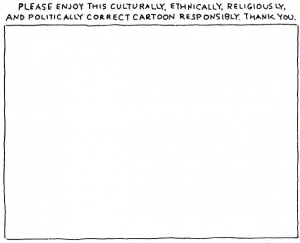 Halloween costumes showing off sombreros are . . . “culturally inappropriate.” Or wearing pirate eye patches . . . “insensitive” to those who are sight challenged. (Note, that’s sight challenged and not sight impaired or blind). Imagine that, guys. Wait a minute. “Guys,” that’s gender biased. Wait another minute, “Imagine that,” that’s improperly questioning those who claim such expressions are politically incorrect. Even thinking they’re wrong, let alone saying it.
Halloween costumes showing off sombreros are . . . “culturally inappropriate.” Or wearing pirate eye patches . . . “insensitive” to those who are sight challenged. (Note, that’s sight challenged and not sight impaired or blind). Imagine that, guys. Wait a minute. “Guys,” that’s gender biased. Wait another minute, “Imagine that,” that’s improperly questioning those who claim such expressions are politically incorrect. Even thinking they’re wrong, let alone saying it.
What in the world is becoming of our present day campuses?
A couple of weeks before Halloween, a group of students at Yale University wrote to their college co-advisor, requesting that she send out a letter to all of the students in that particular Yale college admonishing the students not to wear inappropriate Halloween costumes, citing the above “poor” choices, among others. It was uncertain what consequences these intervening students had in mind for any of their classmates who did not abide by their standards.
To be clear, this group of students felt entitled not only to formulate the rules, but also to direct their faculty representatives to endorse, announce, and enforce them—as apparent agents of the demanding students. (I would have said gofers but no doubt the gopher animal rights activists in their group would have taken offense with that.)
The faculty advisor wrote back to the group saying, in essence, “can you not accommodate a little occasional harmless offense, perhaps just look the other way in the face of any such disfavored costumes, or, if need be, responsibly negotiate for yourself with those of a different view because isn’t free speech discussion and debate the hallmark of a university environment?”
The response was an unequivocal “no.” These angry Yale students became hysterical, “outraged” that their “pain” was being disrespected. They stated that they did not want any “intellectual debate” (at Yale no less); what they wanted—no what they demanded, by golly—was their “safe space.” These Yale students who are treated to a $65,000 per year education want their . . . safe space.
Before I take this true story any further, allow me to emphasize the subtle change in agenda that had materialized at this point in their dialogue. In the opening round, this group was championing the rights of those Hispanics and sight challenged comrades who apparently these “advocates” didn’t think could fend for themselves. In their rebuttal, however, the real agenda had surfaced. It was no longer a concern for the downtrodden minorities. Rather, it was the “outraged,” and “in pain” complaining students themselves, and their demands for a (rent free) “safe space,” that had come front and center, and moved to the head of their list of demands.
So, that was the end of it, right? The resident faculty co-advisors (a husband and wife, the wife had written the first response, but at this point the husband had joined in the exchange) were clearly on even stronger ground than they were initially and they would brook no further nonsense, right? Wrong.
In a follow on meeting, the husband, possibly fearing for his and his wife’s jobs, fell on his sword, apologized for his poor handling of the matter and said how “disappointed” he was in his own performance because he actually felt the same as the student group!
So, that was finally now the end of it, right? Wrong again. Empowered by the collapse of the faculty co-advisors, the advocates of rent free safe space, without appointment or notice, marched to the private residence of the Yale president at about midnight, this time with a new and greater list of demands. They wanted the faculty co-advisors fired, they wanted a public acknowledgment that Yale is situated on land wrongfully appropriated from some group of Native Americans, they wanted their rent free “safe space” (on the same misappropriated lands?), and they wanted an end to all facets of free speech (other than their own).
The Yale president put a prompt end to all of this nonsense, right? He told them to see his secretary and to make an appointment to meet with him during his regular office hours if they wanted to speak to him, right? Nope. He said the midnight hour was fine, and met with them right then and there. (It’s unclear whether he first took the time to change out of his pajamas, and to offer cookies and warm milk.) He told them he felt their “pain,” valued their input, wanted the same “diversity” they wanted (exactly what diversity is that?), and recognized that Yale had “failed” them. He promised to give serious consideration to each of their concerns.
(Interestingly, in sharp contrast, just two years earlier, this same Yale president had assumed the mantle as a staunch defender of free speech. Only two years later, he has flip-flopped, completely abandoning free speech and ideology, blind to the fact (sorry, sight challenged to the fact) that when students insist on protection from differing ideas they have already surrendered any prospect for a meaningful education.
Not to be outdone, last week, a litany of written, “non-negotiable” demands was presented by a group of Amherst students to Amherst’s president, giving him 48 hours to capitulate before they would engage in unspecified “civil disobedience.” On their list: “Admit Amherst’s institutional legacy of white supremacy, colonialism, anti-black racism, anti-Latinx racism, anti-Native American racism, anti-Native indigenous racism, anti-Asian racism, anti-Middle Eastern racism, heterosexism, cis-sexism, xenophobia, anti-Semitism, ableism, mental health stigma, and classism.” They missed “ageism.” Must have been an oversight.
Demonstrating that this attitude of entitlement has gone bi-coastal, a group of Claremont College students last week presented their list of demands to the Claremont administration, obtaining the resignation of a Claremont dean over an insensitive email.
What explains this extraordinary behavior? And what is to be done about it?
 I believe there are two possible explanations. I am a big believer in what is often referred to as the pendulum theory. I believe what we are now witnessing on campuses across the country has grown out of a “politically correct” sensitivity about genuine class bias, racial, gender and sexual orientation. Historically, the pendulum was way too far to one side of the spectrum. (I won’t try to figure out which side.) But can anyone really say that campuses today generally suffer from the magnitude of political incorrectness to the same extent that existed a generation ago? Or that there is any meaningful basis to say that one cannot dress up as a pirate for Halloween without offending some purported class of victims? Can one say, as has recently been asserted, that a taco bar at a fraternity fundraising event is . . . politically incorrect? The pendulum has clearly swung too far to the opposite side of the spectrum.
I believe there are two possible explanations. I am a big believer in what is often referred to as the pendulum theory. I believe what we are now witnessing on campuses across the country has grown out of a “politically correct” sensitivity about genuine class bias, racial, gender and sexual orientation. Historically, the pendulum was way too far to one side of the spectrum. (I won’t try to figure out which side.) But can anyone really say that campuses today generally suffer from the magnitude of political incorrectness to the same extent that existed a generation ago? Or that there is any meaningful basis to say that one cannot dress up as a pirate for Halloween without offending some purported class of victims? Can one say, as has recently been asserted, that a taco bar at a fraternity fundraising event is . . . politically incorrect? The pendulum has clearly swung too far to the opposite side of the spectrum.
The second explanation is what some are now referring to as “cultural Marxism.” There should be no grades in classrooms. There should be no losers in school sports matches. Everyone should be a winner—whether they earn it or not. Parents and teachers alike have been coddling their children in a “safe space” warm cocoon, placating this new generation of “neo-victims” while at the same time turning them into a bunch of cry-bullies. It’s not enough that they provide these “pained,” “hurting” children with a $65,000 per year educational opportunity.
So, identifying the problem and its root causes is not so difficult. The tough part is what’s the solution? Well, for starters, it’s not a bunch of groveling adults who only encourage these malcontents to never grow up.
I think the Amherst students may have put their finger on the answer when they threatened their college with “civil disobedience” if they did not surrender to their non-negotiable demands virtually overnight. Henry David Thoreau, generally credited with defining that term, if not that concept, said, in a paper he wrote in 1849, that every person has a moral duty to stand up, be counted, and object to “unjust” rules. Thoreau also made clear that the disobedience must be peaceful and that the disobedient must be willing to bear the consequences of being disobedient. But, of course, all of that begs the real question: Who gets to be the final arbiter of what is “unjust”? The answer: The “consensus” does. That’s simply the way it must work in a free society.
Consider the campus uprising that began the flurry of recent student protests, the complaint about racism at the University of Missouri. Predicated on biased treatment of a recognized class, the consensus at Missou no doubt supported the complaining students, which received a real boost when the football team and its coach threatened not to play the remainder of their games this year.
If it had stopped there, the consensus would have been solidly behind the protesting students. However, it didn’t stop there because the students segued from attacking an undisputable, unjust anti-black racist environment into an indefensible attack on free speech. The students were caught on video that went viral showing them confronting news media who were attempting to exercise their free speech rights to film the students’ tent city on public property and one of their leaders physically shoving a photographer and calling for “muscle” from her soldiers to back her up.
Reportedly, active protests are now underway at more than one hundred college campuses across the country! There is, however, some hope rising from these ashes. In a push for meaningful consensus to decide what rules are and are not just, and in the face of the Claremont protesters, a second group of students came forward and published a rebuttal in the campus newspaper criticizing the charges of racism as unfounded, criticizing the Claremont dean and president of cowardice in not standing up to the bullying, and the silence of all too many students for not having the courage and conviction to make clear that the protesters did not speak for them. “We are not racist for having different opinions. We are not immoral because we don’t buy the flawed rhetoric of a spiteful movement.”
It is that often silent majority that must find the courage to stand up to the bullies and demonstrate the true consensus. As Aristotle put it long ago, the most important virtue of any worthwhile society is courage because without that virtue, there are no other virtues to practice.
No doubt some of the 100 pending campus protests across the country are legitimate, reasonable, and reasonably contained. When so, the consensus should and presumably will support them, and be sure they are heard. Let us please have the courage to put the bullies who do not speak for a true consensus in their place.
Join the discussion either by logging in just below or by signing into your favorite social media outlet. If you’re having trouble, please follow these instructions to guide you! Thanks!







